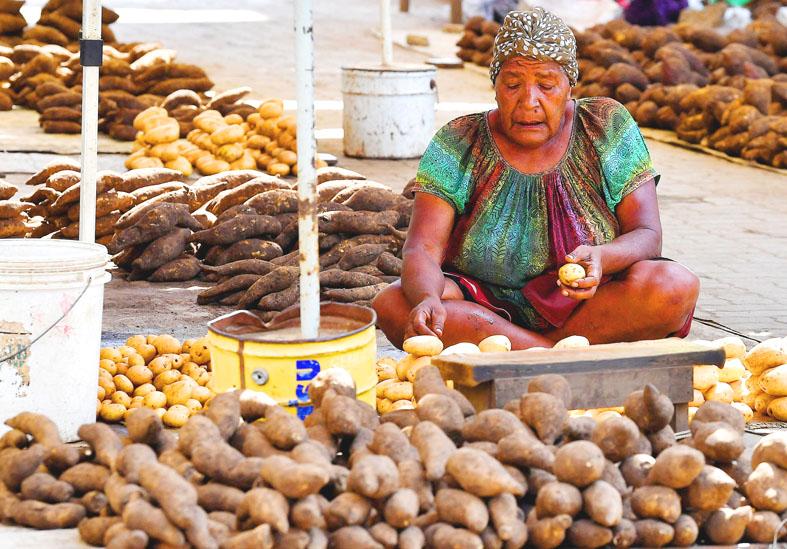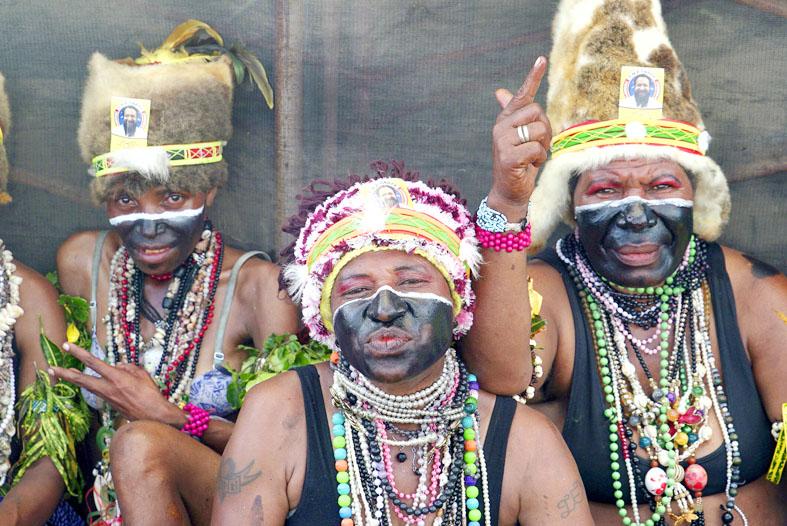Women are fighting to win at least one seat in Papua New Guinea’s (PNG) male-dominated parliament when voting opens tomorrow in a mountainous, forest-clad land scarred by gender-based violence.
Papua New Guinean Prime Minister James Marape is fending off a challenge from his predecessor Peter O’Neill to lead the resource-rich, but poverty-struck, Pacific Island for the next five years.
Whoever wins, the new leader will need to cobble together a coalition government, analysts say.

Photo: AFP
Women are hoping to have a voice in the 118-seat parliament.
In the nearly 50 years since Papua New Guinea gained independence from Australia, only seven women have ever secured a seat, and not one in the last election in 2017.
“A lot of us really feel like we stand a great chance,” said Sylvia Pascoe, one of 142 women among the almost 3,500 candidates in this election. “Not just because the timing is right, but because we’ve spent our lives building up to this moment.”

Photo: AP
Statistics on women’s experiences in the country are alarming: 63 percent have been subject to physical, sexual or emotional violence at the hands of their spouses, a national survey completed four years ago showed.
At least 70 percent of men and women agreed that a man would be justified in beating his wife in at least one of these circumstances: if she burnt food, argued, went out without telling her husband, refused sex or neglected her children.
Pascoe said that women were increasingly taking leadership roles in churches, sports and youth groups, and the “drought” in female representation in politics was sparking a change in sentiment ahead of the election.
“At the last elections, nobody was really out there rooting for women,” she said, but women are expressing a desire to vote for fellow women, and youth groups are singing songs in support of their runs for office.
“People only saw men being leaders. Then suddenly, there was a drought, and they said: ‘Something’s not right, there is no balance,’” Pascoe said.
Women in Papua New Guinea have found it hard to overcome perceptions that only men make leaders, said Jessica Collins, Pacific researcher at the independent Sydney-based Lowy Institute think tank.
There is now more public debate about women’s place in politics, with some young, determined female candidates running smart campaigns this year, Collins added.
“The chance for getting women elected to parliament this time around is probably increasing,” she said.
However, elections in Papua New Guinea can be dangerous.
At the 2017 general election, more than 200 voting-related killings were documented by monitors from the Australian National University.
Election malfeasance was “more brazen than ever before,” the monitors said in a report, citing “serious irregularities” such as voter intimidation and multiple voting.
For female candidates hard-pressed to secure financing, the risks can be even greater, said Pascoe, who sometimes ventures into volatile areas without the large security teams her male rivals enjoy.
So far, she had not encountered significant security issues, but Pascoe said that she had heard stories of crowds throwing stones and bottles at candidates.
“I was in a place the other night where the guy said they haven’t had water for a month,” she said.
“People are desperate,” and when they do not hear what they want from candidates, they can get upset, Pascoe said.
Australia has sent more than 130 troops with transport aircraft to provide security for the vote.
They are to assist the thousands of Papua New Guinean police and troops around the country, with the heaviest deployments in the remote and frequently violent highlands provinces.
Further complicating the process, the electoral roll is not up to date, Australian National University Pacific analyst Harry Ivarature said. “So the whole integrity of this election is already under question.”
Voting is scheduled to take place over 18 days, with the outcome not expected to be clear until next month.
Analysts say the battle to be prime minister could be tight as O’Neill calls for a revival of the resources sector, three years after resigning under pressure over corruption and a failure to spread mining wealth.
In an ethnically diverse country with more than 800 languages, there are few national issues to galvanize voters, and the overriding focus remains on what material benefits candidates can bring to local communities.
Women are hopeful that their voices can break through.
“We might just see a whole new empowered generation rising out of this,” Pascoe said.

A colossal explosion in the sky, unleashing energy hundreds of times greater than the Hiroshima bomb. A blinding flash nearly as bright as the sun. Shockwaves powerful enough to flatten everything for miles. It might sound apocalyptic, but a newly detected asteroid nearly the size of a football field now has a greater than 1 percent chance of colliding with Earth in about eight years. Such an impact has the potential for city-level devastation, depending on where it strikes. Scientists are not panicking yet, but they are watching closely. “At this point, it’s: ‘Let’s pay a lot of attention, let’s

Thousands gathered across New Zealand yesterday to celebrate the signing of the country’s founding document and some called for an end to government policies that critics say erode the rights promised to the indigenous Maori population. As the sun rose on the dawn service at Waitangi where the Treaty of Waitangi was first signed between the British Crown and Maori chiefs in 1840, some community leaders called on the government to honor promises made 185 years ago. The call was repeated at peaceful rallies that drew several hundred people later in the day. “This government is attacking tangata whenua [indigenous people] on all

UNDAUNTED: Panama would not renew an agreement to participate in Beijing’s Belt and Road project, its president said, proposing technical-level talks with the US US Secretary of State Marco Rubio on Sunday threatened action against Panama without immediate changes to reduce Chinese influence on the canal, but the country’s leader insisted he was not afraid of a US invasion and offered talks. On his first trip overseas as the top US diplomat, Rubio took a guided tour of the canal, accompanied by its Panamanian administrator as a South Korean-affiliated oil tanker and Marshall Islands-flagged cargo ship passed through the vital link between the Atlantic and Pacific oceans. However, Rubio was said to have had a firmer message in private, telling Panama that US President Donald Trump

CHEER ON: Students were greeted by citizens who honked their car horns or offered them food and drinks, while taxi drivers said they would give marchers a lift home Hundreds of students protesting graft they blame for 15 deaths in a building collapse on Friday marched through Serbia to the northern city of Novi Sad, where they plan to block three Danube River bridges this weekend. They received a hero’s welcome from fellow students and thousands of local residents in Novi Said after arriving on foot in their two-day, 80km journey from Belgrade. A small red carpet was placed on one of the bridges across the Danube that the students crossed as they entered the city. The bridge blockade planned for yesterday is to mark three months since a huge concrete construction